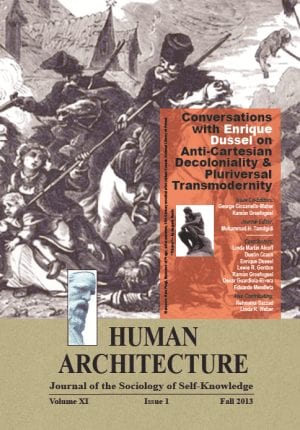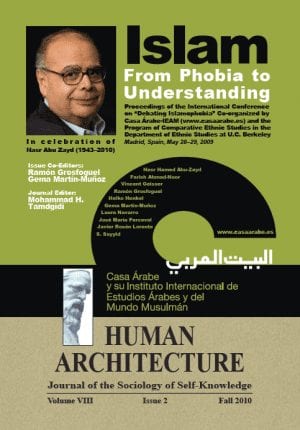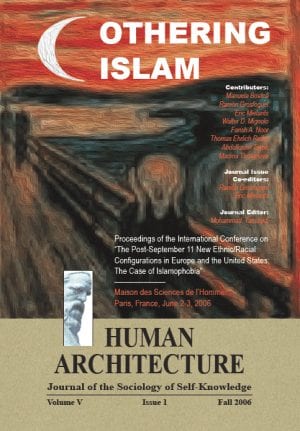Journal Article — Editor’s Note: I Think; Therefore, I Don’t: Tackling the Enormity of Intellectual Inadvertency — by Mohammad H. Tamdgidi
$15.00
This is the journal editor’s note to the Fall 2013 issue of Human Architecture: Journal of the Sociology of Self-Knowledge, entitled “Conversations with Enrique Dussel on Anti-Cartesian Decoloniality and Pluriversal Transmodernity.”
Description
Abstract
This is the journal editor’s note to the Fall 2013 issue of Human Architecture: Journal of the Sociology of Self-Knowledge, entitled “Conversations with Enrique Dussel on Anti-Cartesian Decoloniality and Pluriversal Transmodernity.” In his invitation for a South-South philosophical dialogue as a prelude to a broader global philosophical conversation to advance anti-Cartesian decoloniality and pluriversal transmodernity, Dussel aptly forewarns those from the South embarking on such a conversation to become aware of and avoid what he calls “inadvertent Eurocentricity.” This cautious, self-critical reflexivity not only is indicative of the depth of the project being advanced by Dussel and how he himself biographically arrived at his own world-view, but also points to the enormity of a broader challenge that exists in any liberatory conversation and effort, namely that of intellectual inadvertency. In other words, what can make problems such as ethnocentricity (including Eurocentricity, both as variants of egocentricity), among others, even more of an obstacle in advancing any conversation and practice (be they South-South and/or Global) is the fact that they can also (and often do) take place inadvertently and subconsciously, that is, beyond conscious self-awareness of the actors who otherwise explicitly seek with the best of intentions to advance their liberatory cause devoid of such biases.
This editorial aims to highlight and further emphasize the significance of the subconscious processes that often accompany all political and cultural, including philosophical, dialogues, and reflects on the ways in which Dussel’s conceptual frames and the conversations in the present volume provide opportunities for reflections that may further contribute to understanding the challenge intellectual inadvertency poses in advancing decoloniality and pluriversality. It can be argued that a lack of adequate appreciation of this challenge may also be traceable to the prevailing interpretations of the Cartesian dictum: “I think; therefore, I am”—one that fails to acknowledge the multiplicity and plurality, simultaneously both personal and global, of the selves that constitute the reality of human voice uttering that dictum, leading to a subjective fragmention in discourse that precipitates intellectual inadvertency.
Tamdgidi, Mohammad H. 2013. “Editor’s Note: I Think; Therefore, I Don’t: Tackling the Enormity of Intellectual Inadvertency.” Pp. vii-xii in Conversations with Enrique Dussel on Anti-Cartesian Decoloniality & Pluriversal Transmodernity (Human Architecture: Journal of the Sociology of Self-Knowledge: Volume XI, Issue 1, 2013.) Belmont, MA: Okcir Press (an imprint of Ahead Publishing House).
The various editions of Conversations with Enrique Dussel on Anti-Cartesian Decoloniality & Pluriversal Transmodernity can be ordered from the Okcir Store and are also available for ordering from all major online bookstores worldwide (such as Amazon, Barnes&Noble, and others).
Read the Above Publication Online
To read the above publication online, you need to be logged in as an OKCIR Library member with a valid access. In that case just click on the large PDF icon below to access the publication. Make sure you refresh your browser page after logging in.








